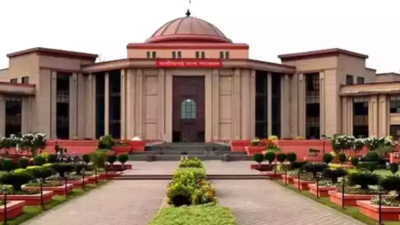'Naxal ambush a threat to national security': Chhattisgarh HC | Raipur News - The Times of India

RAIPUR: The
Chhattisgarh high court
has strongly condemned a 2014 Naxal ambush that claimed the lives of 15 security personnel and four civilians, describing such attacks as a serious threat to national security. The court upheld the
life sentences
of four persons convicted in connection with the incident, stressing the attack’s planned and organised nature.
The ambush took place on 11 March 2014 near Tahakwara village, around four kilometres from Tongpal police station in Darbha block, Bastar, on National Highway 30. A road-opening party (ROP) comprising CRPF and state police personnel was targeted by an estimated 150-200 Maoist cadres from the Darbha Division, led by Surendra, Deva, and Vinod. The ensuing gunfight and IED explosions resulted in heavy casualties among the security forces, along with the death of a civilian. The Maoists also looted weapons from the fallen personnel.
Based on a written complaint by Head Constable Ramcharan Thakur, a case was registered against Sonadhar, Shankar, Sanna, Surendra, Ganesh Uike, Raghu, Sukhram, Vinod, Sumitra, Deva, Pooja, Jamili, Masa, Naresh, Anil, Hidme, Deve, Lucky, Jogi, Budhram, and around 150 to 200 other Maoists.
A Division Bench of Chief Justice Ramesh Sinha and Justice Ravindra Kumar Agrawal emphasised that such attacks are not merely isolated criminal acts but part of a broader, well-coordinated insurgency aimed at destabilising the state and undermining democratic institutions. The court highlighted the premeditated nature of the ambush, the use of advanced tactics and weaponry, and the intent to inflict maximum casualties, distinguishing these attacks from ordinary crimes.
“These attacks are pre-planned, highly organised, and politically motivated, making them far more dangerous than common crimes,” the court observed. “Unlike ordinary crimes like theft or murder, Naxal attacks are acts committed to destabilise the state.” The judgment further noted the use of ambushes, guerrilla warfare tactics, and improvised explosive devices (IEDs) as key characteristics of such operations.
The court acknowledged the challenges in prosecuting such cases, citing the difficulty in identifying and apprehending Naxalites, their use of pseudonyms, and the reluctance of local villagers to testify due to fear of retaliation. However, the court stressed that circumstantial evidence, along with witness testimonies and recoveries of arms and explosives, can be sufficient for conviction.
In this case, the court relied on testimonies from multiple witnesses, including former Naxalites, to establish the accused’s presence and involvement in meetings where the ambush was planned. The court also considered the disclosure statements of the accused and the recovery of incriminating materials. While addressing the defence’s concerns over the admissibility of certain evidence and witness credibility, the High Court ultimately ruled that the prosecution had proven its case beyond reasonable doubt.
During the hearing, the court stated, “A conspiracy is always hatched in secrecy, and it may be difficult to adduce direct evidence. The prosecution will often rely on evidence of acts of various parties to infer that they were done with common intention. The conspiracy can be undoubtedly proved by such evidence, direct or circumstantial.”
The court dismissed the Maoists’ appeals and upheld the NIA court's verdict.
Incident details
On 11 March 2014, a road-opening party (ROP) of 30 personnel from the 80th Battalion of the Central Reserve Police Force (CRPF) and 13 police officers from Tongpal police station was assigned to secure the road for construction workers. At around 10:30 am near Tahakwara village, Maoist cadres from the Darbha division, led by Surendra, Deva, Vinod, and Sonadhar, ambushed the ROP. A civilian passing by was also killed. The Maoists looted weapons and equipment from the fallen personnel, including six AK-47 rifles, an Insas LMG, eight Insas rifles, and two SLR rifles.
Legal proceedings
A case was registered against multiple individuals, including Sanna, Surendra, Ganesh Uike, and others, as well as 150-200 unidentified Maoists. The investigation was transferred to the National Investigation Agency (NIA) on 21 March 2014. The NIA filed charges under various sections of the Indian Penal Code, the Arms Act, and the Unlawful Activities (Prevention) Act (UAPA). The Special Court in Jagdalpur convicted several individuals, including Kawasi Joga, Dayaram Baghel, Maniram Korram, and Mahadev Nag, sentencing them to life imprisonment.
Conviction by NIA Special Judge
The convicts filed an appeal under Section 21(1) of the National Investigation Agency Act, 2008 (NIA), challenging the 12 February 2024 judgment of the Special Judge (NIA Act/Scheduled Offence), Bastar, Jagdalpur, in the Special Sessions Trial. In that trial, the appellants were found guilty. The convicts received life imprisonment for murder (IPC 302), conspiracy (IPC 120-B), and offences under the Explosive Substances Act and UAPA, along with varying sentences under the Arms Act. The convicted individuals are Kawasi Joga alias Pada, Dayaram Baghel alias Ramesh Anna, Maniram Korram alias Boti, and Mahadev Nag.











